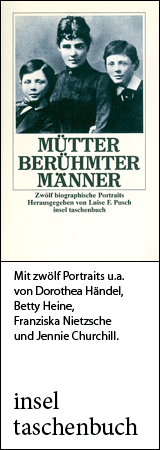
(née Crüsemann)
Born May 3, 1850 in Bremen
Died January 23, 1934 in Berlin
German politician, manager, and pioneer of women’s domestic educational development, active in early German women’s movement
Biography • Literature & Sources
Biography
Hedwig Crüsemann, born into a wealthy Bremen family of shipowners, married the Berlin chemical manufacturer Georg Heyl in 1869. She leveraged her upper-class origins deliberately and with amiable intelligence and charm. She was one of the few women of “high society,” wrote Gertrud Bäumer, who already felt they were part of the women's movement at a time when this had not yet been made “socially acceptable” through the participation of members of the imperial family. Her area of responsibility in the women's movement at the turn of the century was the professionalization of household management. She believed that women's domestic education should go beyond the learning and sharing of time-honored recipes to include budgeting and nutritional issues as well as the care and upbringing of children.
Like many of her contemporaries, Hedwig Heyl was an enthusiastic supporter of the pedagogy of Friedrich Froebel. Together with Henriette Schrader, whose student she was, she founded the Pestalozzi-Froebel-Haus in Berlin, which was expanded in 1884 to include a home economics and culinary school. In 1854, prior to her work in Berlin, Henriette Schrader had founded an educational institute in Watzum near Schöppenstedt: a training center for girls based on Froebel's kindergarten pedagogy.
Hedwig Heyl ably took on representative roles and responsibilities within the women's movement, for example at the International Congress of Women in 1904 and the exhibition “Die Frau in Haus und Beruf” (“The Woman in House and Profession”), both held in Berlin. The success of this exhibition, which opened in 1912, was largely due to Hedwig Heyl's tremendous organizational talent. She herself considered this first women's fair in Germany the zenith of her life and work. Her organizational talent had served her well since 1889, when, as a widow, she had to manage the factory of her late husband and raise her five children.
When World War I broke out, Hedwig Heyl assumed management of the food program as part of the Nationaler Frauendienst (NFD, or National Women's Service League) of the women's movement. She had a “brilliant eye for the concrete and practical” (Gertrud Bäumer). At the outbreak of war in August 1914, for example, the abundant fruit harvest of many small private gardens in Berlin was saved because Hedwig Heyl arranged for the fruit to be processed in a jam factory
As the food situation became increasingly precarious in the course of the war, Hedwig Heyl organized soup kitchens. This extraordinary achievement earned her a reputation as the “Hindenburg of the kitchen.” Her cookbook “Das ABC der Küche” (“The ABC of the Kitchen”) was distributed free of charge as a standard work.
Hedwig Heyl was a member of numerous associations and clubs, including the Deutsch-Kolonialer Frauenbund (German-Colonial Women's Association). Founded in Berlin in 1907, it became part of the German Colonial Society in 1908 and was led by Hedwig Heyl for a decade. The aim of both associations was to make South West Africa a “German” colony. Hedwig Heyl shared the racist views of these societies, including the ban on mixed marriages between colonists and African women. She described it as her most important task “to select women for the colonists… and in general to send suitable girl material” to the settlements. During the brief period of the Weimar Republic, Hedwig Heyl joined the Deutsche Volkspartei (DVP, German People's Party). In 1933 she expressly welcomed Hitler's racial ideology and his visions of a Volksgemeinschaft, or racial community, that also included “our compatriots beyond the German Reich.”
(Text from 1999; transl. Julie Niederhauser)
Author: Hiltrud Schroeder
Literature & Sources
Bäumer, Gertrud. 1939. “Hedwig Heyl”, in: dies. Gestalt und Wandel. Berlin. Herbig, S. 699-708
Brehmer, Ilse & Karin Ehrich. Hg. 1993. Mütterlichkeit als Profession? Lebensläufe deutscher Pädagoginnen in der ersten Hälfte dieses Jahrhunderts. Band 2 Kurzbiographien. Pfaffenweiler. Centaurus.
Kachulle, Doris. 1992. “'Verschicke nur geeignetes Mädchenmaterial': Die Bremerin Hedwig Heyl arbeitete im Deutsch-Kolonialen Frauenbund für die 'Deutschwerdung' Südwestafrikas”, in die tageszeitung. 21.3.1992, S. 35
Reicke, Ilse. 1984. Die großen Frauen der Weimarar Republik: Erlebnisse im Berliner Frühling. Freiburg/Br. Herderbücherei 1029.
If you hold the rights to one or more of the images on this page and object to its/their appearance here, please contact Fembio.



